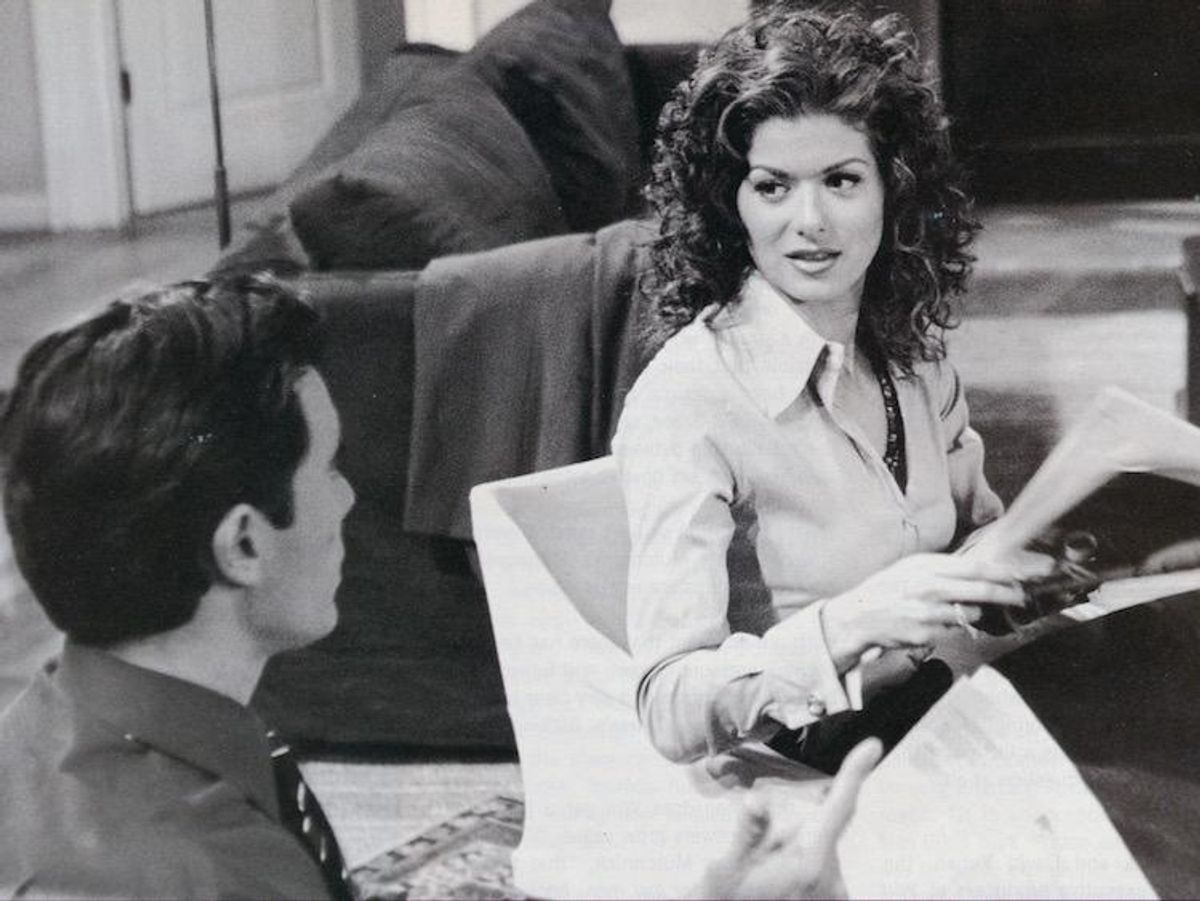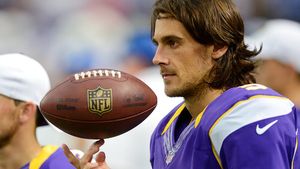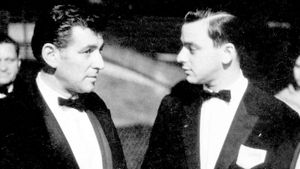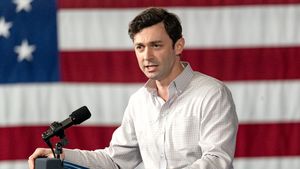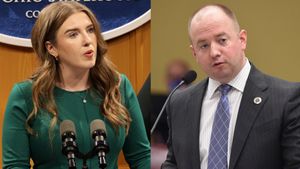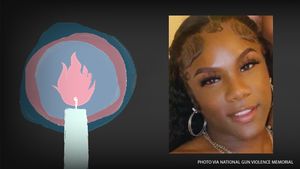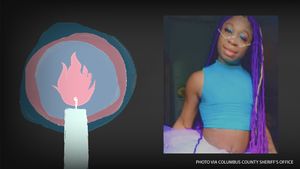This article originally appeared in the December 1998 issue of OUT.
Sitting in the frigid dark of the soundstage watching a blocking rehearsal of Will & Grace, NBC's new sitcom about the enduring friendship between a gay man and a straight woman, I know I should be watching the action onstage. But instead my attention is drawn to an unremarkable spot on the back wall of Will's New York apartment, where I spy a tasteful, black-and-white frame image of two tapering columns--are they buildings? Asparagus?-- that seems awfully... Is it possible? I squint. Probably not.
On closer inspection during a break in the rehearsal, I see that these long, poky things are not penises per se, but black-and-white photographs of some sort of flora, twin vegetable forms spiraling gently but firmly upward. Still, the tender columns rise to an unmistakable point. The blur is clearly intentional, an optical riddle: animal or vegetable?
The premise of Will & Grace is likewise a riddle: What makes gay men and straight women so close? The answer, like the photograph on Will's wall, is in one way obvious, yet in another a bit blurred. Recently, with the success of My Best Friend's Wedding and The Object of My Affection, it's become apparent that America finds the pairing fascinating, perhaps even a bit titillating. What are they laughing about, those two, always off in the corner together?
Will and Grace fall more or less into this mold: Will (Eric McCormack) is quietly handsome, with a Banana Republic fashion sense; Grace (Debra Messing) is telegenic with a knockabout light comic style. "When you take the sex out of it," says Messing, "there is a freedom that's very specific to that kind of relationship. You can go much deeper." But while there isn't sex as such, there is a subtle romance, a debonair, Rock Hudson-Doris Day sort of vibe. Is it any accident that in both Wedding and Affection the gay man and the straight woman twirled in perfect sync over a ballroom floor?
With the greatly esteemed James Burrows (Cheers) signed up to direct the first 13 episodes, hopes are high. "This show is like a shiny penny," says Megan Mullally, who plays Grace's minx-like assistant, Karen. The show is casually, even elegantly, post-Stonewall: Will is understated but by no means closeted, and neither is his eminently campy friend Jack. (As played by Sean Hayes, Jacks seems to have issued from the joint loins of Pee-wee Herman and Paul Lynde). And the network insists there are no limits. "We haven't set out a series of ground rules," says NBC Entertainment president Warren Littlefield in a smooth and level voice, adding that the show is one of his "favorites" of the new season.
Somewhat less than elegant, however, is the publicist who fairly screams into the phone at me before we've set up a single interview, "Just don't ask me when anyone's going to kiss! That's so boring!" A Freudian might say that this is a little hint that it's not a very boring question at all.
Max Mutchnick and David Kohan, the creators and executive producers of Will & Grace, are charming men who have the habit of dressing alike to a twinsome degree. Seated side by side on a sofa in their sun-drenches bungalow office, wearing identical button-down shirts, they say they are extremely alike in other ways, too. But in this complementary pair, the more volatile, gay Mutchnick seems to be pepper, while the more laid-back, straight Kohan is salt. Both in their early 30s, the team worked together previously on Boston Common and Dream On, as well as on other shows that Kohan describes wearily as "very hetero comic." There is much talk of Will and Grace being the sort of friends who "finish each other's sentences," and these are just the sort of friends Mutchnick and Kohan, who met during a high school production of West Side Story, are.
"David played Riff," recalls Mutchnick, "and I should let you know that he beat out a certain Nic Cafe for the part. I was in the role of Baby John, which I played in every musical--"
"In The Crucible you played Baby John--" Kohan interjects.
"Because I was four-foot-nothing and heavy," finishes Mutchnick.
"He wasn't really that heavy," corrects Kohan. "He had more of a boyish, teddy bearish kind of thing."
The two maintain that the premise for the show originated from their longtime tie with a straight woman friend, but it seems possible that their own relationship may have been a source as well. The central idea of Will & Grace, says Kohan, is "What is a relationship between a man and a woman like when sex doesn't get in the way?"
"And I think that's a very good subversive message," says Mutchnick. "Relationships are relationships are relationships."
The two share an open, unjaded quality, like freshman college students. Asked to some up Will & Grace in one sentence, Kohan offers, "What is the nature of platonic love?"
Mutchnick nods. "I wouldn't rewrite that."
"Although," Kohan goes on, "Plato was out screwing little boys."
Meanwhile, Eric McCormack, who is straight, is happily settling into a role he hopes to play for a long time. "This guy is so much me," he says. "Aside from the sexuality, everything else about Will is me." And he's being doing his homework. "I recently read a booky by--I'm going to say his name wrong--Michelangelo Signorile?" He gives it an elaborate Italianate spin. "It's fascinating. I guess the community would call Will 'straight acting.'"
As to just when Will might get laid--or even kissed--McCormack says, "Now I'm almost a crusader. Five episodes in, and I'm saying 'Can Will look at a guy?' But I say to the gay press: Guys, just give us a chance. If we push too much too soon, it's too much for America, we go off the air, and then who wins?"
Of course, shows bow to pressure from network executives slightly more often than they do the gay press. Tim Doyle, the head writer on Ellen in its last besieged year, learned this lesson just a few months ago. "I'm a straight man," he says, "and I'm not particularly political. I didn't have a gay agenda--I had a storytelling agenda." But to Doyle's dismay, as he began exploring his heroine's personal life and the show came under fire from the affiliates, memos fluttered in from New York asking him to please play by conventional rules.
Does gayness even reside in sex? There's a lot of highly popular camp flying around the small screen these days, from Buffy the Vampire Slayer to Frasier to the over-the-top drag style of Veronica's Closet. Frasier, for instance, revolves around the adventures of two effete and quippy men who would rather discuss opera than football and are far more devoted to one another than to any woman.
But post-Ellen, the cat, as it were, is out of the bag. Gayness is expressed not only in a marketable attitude or amusing style but in damp physical acts, such as kisses. Here, America grows nervous. As head writer on thirtysomething in 1990, Richard Kramer ran into a wall of resistance to showing two men lying in bed together post-coitally (although it did dinally air). Nearly 10 years later, little had improved: An episode he wrote about a gay priest for the since-canceled Nothing Sacred was considered too controversial to run. "The most overused word in entertainment," Kramer says with some bitterness, "is courage."
Will & Grace, not having the luxury of Frasier's elaborate in-joke subtext, cannot rely on what Kramer refers to as "the wink," the sense of complicity in what everyone knows but never says, a narrative fig lead. The two gay characters on Will & Grace stand winkless before America, raising by their out presence a question the land of "don't ask, don't tell" doesn't know how to answer: Gayness may not depend entirely on sex, but what, exactly, is a sexual identity without it?
